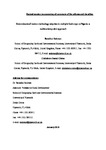Determinants of modern technology adoption in multiple food crops in Nigeria: a multivariate probit approach
| dc.contributor.author | Rahman, Sanzidur | |
| dc.contributor.author | Chima, CD | |
| dc.date.accessioned | 2016-04-13T15:03:50Z | |
| dc.date.available | 2016-04-13T15:03:50Z | |
| dc.date.issued | 2015-04-01 | |
| dc.identifier.issn | 2047-3710 | |
| dc.identifier.uri | http://hdl.handle.net/10026.1/4493 | |
| dc.description.abstract |
Farmers generally produce multiple crops while selectively adopting modern technologies in them to meet various needs. The present study jointly determines the factors influencing decisions to adopt modern technologies (i.e., HYV seeds and/or fertilizers) in multiple food crops (i.e., rice, yam and cassava) using a survey data of 400 farmers from Nigeria by applying a multivariate probit model. Model diagnostic reveals that the decisions to adopt modern technologies are significantly correlated, implying that univariate analysis of such decisions are biased, thereby, justifying use of multivariate approach. Results reveal that 68% of the farmers grew at least two food crops. Output price is an important determinant of HYV adoption. Farming experience is positively associated with HYV adoption whereas remoteness of extension services is negatively associated. HYV technology adoption is relatively higher for small farms whereas large farms use more fertilizers. Access to credit positively influences modern technology adoption. High profit is the main motive for adopting modern technologies. Policy recommendations include investments in extension infrastructure and credit services as well as measures to stabilise and/or improve output price efficiency, e.g., government procurement of outputs during harvest, grading and standardisation of food crops, reducing transaction costs of marketing and trade policies. | |
| dc.language.iso | en | |
| dc.title | Determinants of modern technology adoption in multiple food crops in Nigeria: a multivariate probit approach | |
| dc.type | journal-article | |
| plymouth.journal | International Journal of Agricultural Management | |
| dc.identifier.doi | 10.5836/ijam/2015-03-100 | |
| plymouth.organisational-group | /Plymouth | |
| plymouth.organisational-group | /Plymouth/Faculty of Arts, Humanities and Business | |
| plymouth.organisational-group | /Plymouth/Users by role | |
| dcterms.dateAccepted | 2014-05-01 | |
| dc.rights.embargoperiod | Not known | |
| rioxxterms.versionofrecord | 10.5836/ijam/2015-03-100 | |
| rioxxterms.licenseref.uri | http://www.rioxx.net/licenses/all-rights-reserved | |
| rioxxterms.licenseref.startdate | 2015-04-01 | |
| rioxxterms.type | Journal Article/Review |


